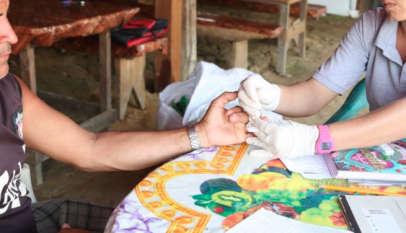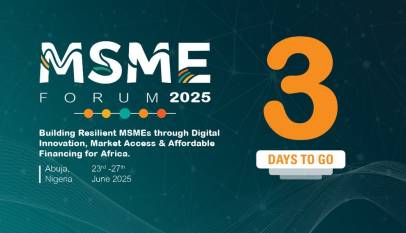Day Emir Sanusi honored MNCH2’s community-based volunteers
During a recent community outreach by the Emir of Kano, Mallam Muhammadu Sanusi II, the monarch presented gifts and awards of recognition to village heads, volunteer emergency transport officers, LGA-level PHC officials and other community-based volunteers working with MNCH2 and other DFID programmes to ensure improved access to quality healthcare for women and children at the grassroots in Kano state.

As part of the quarterly community-focused sensitization campaigns being embarked upon by the Emir of Kano, His Highness Muhammadu Sanusi II, the monarch was recently in Tofa LGA of Kano state where, as usual, he sensitized his subjects on the importance of access to quality healthcare and nutrition for pregnant women and children, education for the girl-child and the need to end domestic and sexual violence against women and children.
Since its inception, the Kano Emirate Council Committee on Health and Development (KECCoHD),set up by Emir Sanusi II, has been working to strengthen access to healthcare services including maternal and child healthcare, routine immunization as well as improved environmental hygiene and outreach services in hard-to-reach rural communities of Kano.
The recent round of the Emir’s quarterly outreach which took place across different LGAs of Kano state is being organized by KECCoHD, with the support of the UK Department for International Development-funded Maternal, Neonatal and Child Health (MNCH2) programme.
The community outreach which was personally attended by the Emir of Kano, Malam Muhammadu Sanusi II and the deputy governor of Kano state, Dr Nasiru Yusuf Gawuna also featured presentation of gifts and awards of recognition by Emir Sanusi II to mothers who had completed ANC and also delivered at a healthcare facility and whose children had completed receiving immunization. Others were village heads, emergency transport officers, community volunteers, amongst others, working to ensure improved access quality healthcare for women and children at the grassroots.
While speaking about the objectives of the community outreach, Dr Bashir Muhammad, Dankadai of Kano, who represented the chairman of KECCoH, Alhaji Wada Aliyu, Sarkin Yaki of Kano, said the Committee’s partnership with the Kano State Ministry of Health and Kano State Primary Healthcare Management Board (SPHCMB) was the only means of ensuring pregnant women at the grassroots had access to quality healthcare while children had access to routine immunization and nutritious diet.
“Nutrition is a key challenge among women and children in northern Nigeria; it is critical to achieving proper growth and development among children. Healthy children are better able to learn therefore perform well in education. The MNCH2 program has done a great job in terms of supporting our work, working with Facility Health Committees(FHCs) and Hospital Friends Committees (HFCs) to address the healthcare challenges of women. We are also grateful to other development partners such as PERL, UNICEF, CHAI and Chigari Foundation,” he said.
In his speech at the event, the Kano State Commissioner of Health Dr Kabiru Ibrahim Getso,who was represented at the event by his permanent secretary, Usman Bala, said Kano had recorded significant successes in terms of coverage for routine immunization, since the establishment of KECCoH adding that prior to the Committee’s emergence, RI coverage in Kano was barely around 16%.
“The most recent survey has shown there is over 73% improvement in coverage for RI in Kano state and for now over 55 consecutive months, not a single case of polio virus has been recorded in the state, thanks to the sensitization effort of KECCoHD. We are therefore appealing to His Royal Highness to consider extending the mandate of KECCoHD to enable the committee caters for other health-related challenges,” he said.
While delivering his remarks, Emir Muhammad Sanusi II decried the fact that Kano state had the highest burden of malnourished children in the North West region which he blamed on lack of access to nutritious diet and improper breastfeeding practices. This he said was responsible for the deaths of numerous children and making infants vulnerable to many diseases which affect the development of their brains and subsequently learning abilities in school.
“As we have always said, it is necessary for us to ensure our children (boys and girls)have access to quality Western and Islamic education as well as entrepreneurship education; access to education for girls is also directly linked to quality of health available and accessible to them. Research has shown that healthcare challenges are more common among women that lack education and those without sources of income generation. Lack of education among women also affects the quality of care they provide to their children,their attitude towards environmental hygiene and the way they worship,” said Emir Sanusi.
He said it was after realizing the enormity of the life-threatening healthcare challenges facing women and children in Kano around access to routine immunization that they decided to come up with KECCoHD as well as establish its structures down to ward levels, to monitor and ensure access to quality healthcare services such as ANC and routine immunization to women and children.
“We are really grateful for the MNCH2 programme which has introduced several programmes targeted at improving the healthy wellbeing of women, among many other health-focused initiatives in Kano state. There is no doubt this initiatives are of great value as such, ensuring sustainability for them becomes mandatory towards attaining quality healthcare for all and achieving sustainable development in Kano state,” he said.
Speaking on behalf of DFID, Nafisa Ado, regional coordinator and head of Kano Office for the UK’s Department for International Development (DFID) acknowledged the important role of Emir Sanusi II and the emirate council – through its traditional leaders from the level of ward heads up to district heads – in changing the poor health, and education indices in northern Nigeria.
“We at DFID, see the logic behind His Highness’s creation of KECCoHD. We also commend the choice of individuals in the committee who are untiring in their support and dedication toward improving maternal and child health, nutrition and girl-child education in Kano. It is because of their dedication that I felt it will be of significant value to strengthen their capacity. So, through our DFID funded MNCH2 and PERL programmes, we are supporting KECCoHD to develop 5-year strategic Plan that will ensure the KECCoHD is strengthened into a sustainable structure of the emirate council rather than a committee,” she said.
Ado decried the fact that population expulsion was threatening the availability of quality life for the elderly, women, youths, children as well as other vulnerable groups in Kano state adding that, in consideration of Emir Sanusi II’s line of thinking, and his ‘keen interest in the betterment’ of the lives of the Kano people, DFID was also keen in making demographics a key area of collaboration with the Emir and Emirate Council through KECCoHD, going forward.
“If we continue along the current trajectory with insufficient investment in human capital, we may face a demographic disaster due to massive unemployment, unskilled/uneducated workforce, inadequate basic services, insecurity and high dependency ratios.However, if we invest in more qualitative education (especially girls’education), better healthcare and nutrition (especially for children and pregnant women) and we develop progressive economic policies, then our huge size will become an asset to us,” she said.
In his reaction, the deputy governor of Kano state, Dr Nasiru Yusuf Gawuna, said to address the challenge of lack of health workers in Kano, he was going to take forward the need to consider the training and integration of Traditional Birth Attendants (TBAs) into the formal health system in Kano state and thanked DFID for their support to the health sector in Kano state, through MNCH2 and other programmes.
“We are grateful to DFID for the lots of work they are doing in Kano state, alongside other development partners. We call on you to bring forward whatever programmes you are planning to come up with, I assure you we will work with you to ensure the development of our people,” he said.
The hallmark of the event was when His Royal Highness, Malam Muhammadu Sanusi II personally presented of gifts and awards of recognition to mothers who had completed ANC, delivered at a healthcare facility and whose children had completed receiving immunization as well as community leaders and volunteers, government health workers, working to ensure improved access to quality healthcare for women and children at the grassroots across Kano state.
Those who received the Emir’s gifts and awards included emergency transport officers (who work to lift pregnant women to nearest healthcare facilities during emergencies), members of male and female support groups who mobilized andenlighten men and women on the importance of ANC services, hospital deliveryand RI for their children.
Others were village heads who coordinate the activities of KECCoH by ensuring pregnant women go to healthcare facilities, children are immunized and maternal, neonatal and child deaths records were properly kept, amongst others. Also honoured at the event were outstanding staffs of the state primary healthcare development agency, community health extension workers (CHEWs), LGA-level PHC officials and Traditional Birth Attendants (TBAs) working to ensure improved service delivery for women and children at the grassroots.












